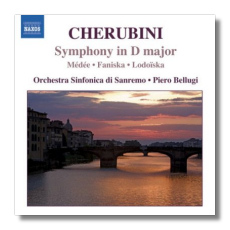
The Internet's Premier Classical Music Source
Related Links
- Cherubini Reviews
- Latest Reviews
- More Reviews
-
By Composer
-
Collections
DVD & Blu-ray
Books
Concert Reviews
Articles/Interviews
Software
Audio
Search Amazon
Recommended Links
Site News
 CD Review
CD Review
Luigi Cherubini

- Symphony in D Major
- Overture "Médée"
- Overture "Faniska"
- Overture "Lodoïska"
Orchestra Sinfonica di Sanremo/Piero Bellugi
Naxos 8.557908 DDD 56:07
Cherubini (1760-1842) was a contemporary of Beethoven, who admired him greatly. His Médée (or Médea, to use its more frequently encountered Italian title) is revived every now and then when the right soprano comes along. His Symphony in D was programmed by Toscanini, and for many, the associated recording on RCA Victor was all they knew of this composer. The symphony has fallen out of fashion, even more than the several Requiems that he composed.
The Symphony in D was commissioned by Philharmonic Society of London, which he briefly visited in 1815. It is a conservative work, strongly reminiscent of Beethoven and (especially) Schubert, although one can sense Cherubini standing on his tip-toes and peering into the future at certain points. The best movement, to my ears, is the Menuetto. It has a charming melody, almost Haydn-esque, which the composer is only too glad to put through surprising harmonic twists and turns that are definitely not characteristic of Haydn!
With the exception of the late Ali-Baba, Cherubini's career as an opera composer came to an end in 1813. Faniska and Lodoïska both belong to the genre sometimes known as "rescue operas" – Beethoven's Fidelio would be another example. Médée, of course, is the story, derived from Euripedes, of a woman who kills her own children after she is jilted by their father, Jason (of Argonaut fame). Like the symphony, the overtures reveal a strong personality within a Classical frame, but not so much that is distinctive, especially melodically. Médée is the best of the three, because it aptly captures the anti-heroine's tragic rage.
Compared to Toscanini's 1952 recording from Carnegie Hall, Bellugi's performance of the Symphony in D comes across as rather mellow. Bellugi does not drive the work nearly as hard, nor does he emphasize its extremes as much. If the NBC Symphony Orchestra can be likened to a Ferrari, the Orchestra Sinfonica di Sanremo is more like the family Fiat. Both get you where you want to go, although one is flashier and faster. The same goes for the overtures. (Toscanini's 1950 broadcast of Médée is nearly a minute faster.) Frankly, I feel that Bellugi is more content than Toscanini to let Cherubini be himself, and even though his orchestra is not as well-drilled as Toscanini's, there's a genial quality here missing in Toscanini's performances. It's nice to have both of them available. Naxos' capable engineering does nothing to alter my opinion of this disc either way.
Copyright © 2007, Raymond Tuttle




















